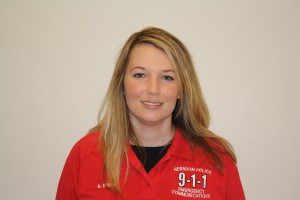Telecommunicator Spotlight: Sheridan Ryan
As a teenager, Sheridan Ryan, 31, took a law enforcement class in high school, and she also was an underage buyer for the Alcohol Beverage Control (ABC) Board. When she left that job, she stayed in touch with the Special Agents of the ABC Board while she worked in the dental field for four years. Through her contact with the agents, she learned of a job opening for a dispatcher and applied.
In her early 20s, Ryan became a dispatcher, which was something she always wanted to be. First, she did her research to learn about the job and what it entailed. For the past 8 ½ years, she has served as a Communications Tech II for the Herndon (Va.) Police Department. “I’ve seen many people come and go. I was really prepared. I did a lot of research,” she says.
To be effective in the job, Ryan believes telecommunicators must be skilled in multitasking, which she says she has always had a knack for. In addition, she says you have to have thick skin and be able to let things roll off your back. “You have to know why you got started in this field and why you wanted to do this on day one, and look back 10 years later and be glad you have the job and are part of the team,” Ryan says.
Dispatching encompasses basic customer service, and Ryan is of the opinion that you have to thrive on stress. “We take a lot of abuse from the public,” Ryan says. She acknowledged that calltakers and dispatchers talk to people in their worst moments and, therefore, it is necessary for communications personnel to have empathy. She acknowledged that people are under high stress and must be offered support. In her view, this applies to co-workers as well.
“I love the department I work for. I love helping people. I love being the first person they talk to. I love helping officers with their jobs,” Ryan says. There are 57 officers in Ryan’s department, and she has a mixture of friends both inside and outside the department. She regularly goes on ride-alongs with her police colleagues. “I think it is more valuable to ride when you’ve been doing this for a while,” Ryan says.
There are nine dispatchers in her department. Ryan works 12-hour shifts, 15 days per month, with every other weekend off. “I really enjoy my days off. I really relax and do fun things,” she says. In her free time, Ryan enjoys doing crafts and she reads a lot—both fiction and non-fiction. She likes to keep up with current events and she enjoys camping, hiking, concerts, visiting wineries, painting, cooking, art journaling and traveling to Georgia to visit her nieces and nephews.
When she experiences stress at work, she will talk to a sergeant or colleague about it. She vents on someone she trusts which, she says, “brings me back to reality.” Her family understands how important her job is to her. “Most people are very supportive and impressed,” she says.
Ryan acknowledged that everyone in the field has calls that affect them in certain ways. She admitted that some calls remind her of her own loss in life, and that makes her more sensitive. One call, a sexual assault, stands out in her memory and it occurred when she was a young dispatcher and very new to the job. With greater experience under her belt now, she feels more comfortable dealing with calls of this nature.
Ryan prefers dispatching to calltaking. In her view, there are certain personalities that are a good fit for the job, and she acknowledged she has seen smart, capable people who have not been able to succeed. She says you have to put yourself in the shoes of the citizens as well as the officers.
Her communications colleagues are her second family. She is very close with several families that she works with and says, “They are really some of the best people I’ve known.” She adds, “It takes a certain kind of person to be with someone who does this job.”
Ryan received several Meritorious Action Awards for her work. She received two in 2011 and one in 2013. In a world where friends have college degrees and cannot get jobs, Ryan says she was grateful to be hired when she was and glad to be working with the people she works with. “I feel very proud of the work I do and the community I live in and give back to. I’m proud to be part of the law enforcement field and the officers I work with. I see them do wonderful things,” Ryan says. Obviously, Ryan, too, is doing wonderful things.
Karen L. Bune serves as an adjunct professor at George Mason University and Marymount University in Virginia, and she is a consultant for the Training and Technical Assistance Center for the Office for Victims of Crime and the Office of Juvenile Justice and Delinquency Prevention, U.S. Department of Justice. She is a nationally recognized speaker and trainer on public safety issues. Ms. Bune is Board Certified in Traumatic Stress and Domestic Violence, and she is a Fellow of The Academy of Experts in Traumatic Stress and the National Center for Crisis Management. She serves on the Institutional Review Board of The Police Foundation, Washington, D. C.


